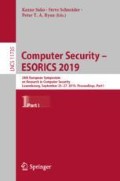Abstract
We clear up confusion surrounding privacy claims about the ICAO 9303 standard for e-passports. The ICAO 9303 standard includes a Basic Access Control (BAC) protocol that should protect the user from being traced from one session to another. While it is well known that there are attacks on BAC, allowing an attacker to link multiple uses of the same passport, due to differences in implementation; there still remains confusion about whether there is an attack on unlinkability directly on the BAC protocol as specified in the ICAO 9303 standard. This paper clarifies the nature of the debate, and sources of potential confusion. We demonstrate that the original privacy claims made are flawed, by uncovering attacks on a strong formulation of unlinkability. We explain why the use of the bisimilarity equivalence technique is essential for uncovering our attacks. We also clarify what assumptions lead to proofs of formulations of unlinkability using weaker notions of equivalence. Furthermore, we propose a fix for BAC within the scope of the standard, and prove that it is correct, again using a state-of-the-art approach to bisimilarity.
Access this chapter
Tax calculation will be finalised at checkout
Purchases are for personal use only
Notes
- 1.
This information on an old bug in ProVerif is due to Stéphanie Delaune and Vincent Cheval.
- 2.
- 3.
References
Machine readable travel documents. part 11: Security mechanisms for MRTDs. Technical report Doc 9303. Seventh Edition, International Civil Aviation Organization (ICAO) (2015). https://www.icao.int/publications/Documents/9303_p11_cons_en.pdf
ISO 15408–2: Common criteria for information technology security evaluation. part 2: Security functional requirements. Technical report. CCMB-2017-04-002, ISO/IEC standard (2017). https://www.commoncriteriaportal.org/files/ccfiles/CCPART2V3.1R5.pdf
Abadi, M., Blanchet, B., Fournet, C.: The applied pi calculus: mobile values, new names, and secure communication. J. ACM 65(1), 1:1–1:41 (2017)
Arapinis, M., Chothia, T., Ritter, E., Ryan, M.: Analysing unlinkability and anonymity using the applied pi calculus. In: 2010 23rd IEEE Computer Security Foundations Symposium (CSF), pp. 107–121. IEEE (2010)
Avoine, G., Beaujeant, A., Hernandez-Castro, J., Demay, L., Teuwen, P.: A survey of security and privacy issues in epassport protocols. ACM Comput. Surv. 48(3), 47:1–47:37 (2016)
Bender, J., Fischlin, M., Kügler, D.: Security analysis of the PACE key-agreement protocol. In: Samarati, P., Yung, M., Martinelli, F., Ardagna, C.A. (eds.) ISC 2009. LNCS, vol. 5735, pp. 33–48. Springer, Heidelberg (2009). https://doi.org/10.1007/978-3-642-04474-8_3
Briais, S., Nestmann, U.: Open bisimulation, revisited. Theor. Comput. Sci. 386(3), 236–271 (2007)
Brusó, M., Chatzikokolakis, K., Etalle, S., den Hartog, J.: Linking unlinkability. In: Palamidessi, C., Ryan, M.D. (eds.) TGC 2012. LNCS, vol. 8191, pp. 129–144. Springer, Heidelberg (2013). https://doi.org/10.1007/978-3-642-41157-1_9
Cheval, V.: Automatic verification of cryptographic protocols: privacy-type properties. PhD thesis, Laboratoire Spécification et Vérification, ENS Cachan (2012)
Cheval, V.: APTE: an algorithm for proving trace equivalence. In: Ábrahám, E., Havelund, K. (eds.) TACAS 2014. LNCS, vol. 8413, pp. 587–592. Springer, Heidelberg (2014). https://doi.org/10.1007/978-3-642-54862-8_50
Cheval, V., Comon-Lundh, H., Delaune, S.: A procedure for deciding symbolic equivalence between sets of constraint systems. Inf. Comput. 255(Part 1), 94–125 (2017)
Cheval, V., Kremer, S., Rakotonirina, I.: DEEPSEC: Deciding equivalence properties in security protocols theory and practice. In: 2018 IEEE Symposium on Security and Privacy (S&P), pp. 529–546 (2018)
Chothia, T.: Analysing the MUTE anonymous file-sharing system using the pi-calculus. In: Najm, E., Pradat-Peyre, J.-F., Donzeau-Gouge, V.V. (eds.) FORTE 2006. LNCS, vol. 4229, pp. 115–130. Springer, Heidelberg (2006). https://doi.org/10.1007/11888116_9
Chothia, T., Smirnov, V.: A traceability attack against e-passports. In: Sion, R. (ed.) FC 2010. LNCS, vol. 6052, pp. 20–34. Springer, Heidelberg (2010). https://doi.org/10.1007/978-3-642-14577-3_5
Cortier, V., Rusinowitch, M., Zalinescu, E.: Relating two standard notions of secrecy. Log. Methods Comput. Sci. 3(3), 1–29 (2007)
Cremers, C.J.F.: The scyther tool: verification, falsification, and analysis of security protocols. In: Gupta, A., Malik, S. (eds.) CAV 2008. LNCS, vol. 5123, pp. 414–418. Springer, Heidelberg (2008). https://doi.org/10.1007/978-3-540-70545-1_38
Dolev, D., Yao, A.: On the security of public-key protocols. IEEE Trans. Inf. Theory 2(29), 198–208 (1983)
Feldhofer, M., Dominikus, S., Wolkerstorfer, J.: Strong authentication for RFID systems using the AES algorithm. In: Joye, M., Quisquater, J.-J. (eds.) CHES 2004. LNCS, vol. 3156, pp. 357–370. Springer, Heidelberg (2004). https://doi.org/10.1007/978-3-540-28632-5_26
Hirschi, L., Baelde, D., Delaune, S.: A method for verifying privacy-type properties: the unbounded case. In: 2016 IEEE Symposium on Security and Privacy (S&P), pp. 564–581. IEEE (2016)
Hirschi, L., Baelde, D., Delaune, S.: A method for unbounded verification of privacy-type properties. J. Comput. Secur. 27(3), 277–342 (2019)
Horne, R.: A bisimilarity congruence for the applied \(\pi \)-calculus sufficiently coarse to verify privacy properties, (arXiv:1811.02536) (2018), https://arxiv.org/abs/1811.02536
Horne, R., Ahn, K.Y., Lin, S.W., Tiu, A.: Quasi-open bisimilarity with mismatch is intuitionistic. In: Dawar, A., Grädel, E. (eds.) Proceedings of 33rd Annual ACM/IEEE Symposium on Logic in Computer Science, Oxford, United Kingdom, 9–12 July 2018, pp. 26–35 (2018)
Kanellakis, P.C., Smolka, S.A.: CCS expressions, finite state processes, and three problems of equivalence. Inf. Comput. 86(1), 43–68 (1990)
Milner, R., Parrow, J., Walker, D.: Modal logics for mobile processes. Theor. Comput. Sci. 114(1), 149–171 (1993)
Sangiorgi, D.: A theory of bisimulation for the \(\pi \)-calculus. Acta Informatica 33(1), 69–97 (1996)
Tiu, A., Dawson, J.: Automating open bisimulation checking for the spi calculus. In: 2010 23rd IEEE Computer Security Foundations Symposium. pp. 307–321. IEEE (2010)
Acknowledgements
We thank the following people for their time and knowledge during the investigation of these results: Vincent Cheval, Ugo Chirico, Stéphanie Delaune, Lucca Hirschi, and Steve Kremer.
Author information
Authors and Affiliations
Corresponding author
Editor information
Editors and Affiliations
Rights and permissions
Copyright information
© 2019 Springer Nature Switzerland AG
About this paper
Cite this paper
Filimonov, I., Horne, R., Mauw, S., Smith, Z. (2019). Breaking Unlinkability of the ICAO 9303 Standard for e-Passports Using Bisimilarity. In: Sako, K., Schneider, S., Ryan, P. (eds) Computer Security – ESORICS 2019. ESORICS 2019. Lecture Notes in Computer Science(), vol 11735. Springer, Cham. https://doi.org/10.1007/978-3-030-29959-0_28
Download citation
DOI: https://doi.org/10.1007/978-3-030-29959-0_28
Published:
Publisher Name: Springer, Cham
Print ISBN: 978-3-030-29958-3
Online ISBN: 978-3-030-29959-0
eBook Packages: Computer ScienceComputer Science (R0)

